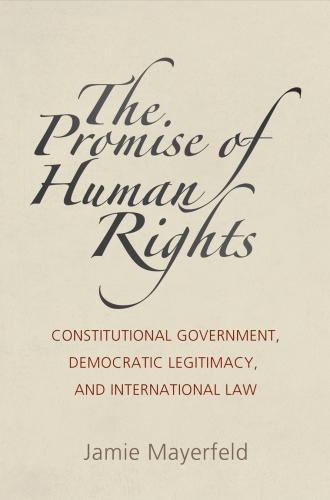The Promise of Human Rights
PENNSYLVANIA STUDIES IN HUMAN RIGHTS
Bert B. Lockwood, Jr., Series Editor
A complete list of books in the series is available from the publisher.
The Promise of Human Rights
Constitutional Government, Democratic Legitimacy, and International Law
Jamie Mayerfeld
UNIVERSITY OF PENNSYLVANIA PRESS
PHILADELPHIA
Copyright © 2016 University of Pennsylvania Press
All rights reserved. Except for brief quotations used for purposes of review or scholarly citation, none of this book may be reproduced in any form by any means without written permission from the publisher.
Published by
University of Pennsylvania Press
Philadelphia, Pennsylvania 19104-4112
Printed in the United States of America on acid-free paper
10 9 8 7 6 5 4 3 2 1
Library of Congress Cataloging-in-Publication Data
ISBN 978-0-8122-4816-6
for Peter Mack
Contents
Chapter 2. Madison’s Compound Republic and the Logic of Checks and Balances
Chapter 3. Europe and the Virtues of International Constitutionalism
Chapter 4. American Exceptionalism and the Betrayal of Human Rights, Part I: The Torture Memos
Chapter 5. American Exceptionalism and the Betrayal of Human Rights, Part II: Enabling Torture
Chapter 6. The Democratic Legitimacy of International Human Rights Law
“[M]en can never be secure from tyranny, if there be no means to escape it till they are perfectly under it; and, therefore, it is that they have not only a right to get out of it, but to prevent it.”
—John Locke, Second Treatise of Government, 1690
“No man is allowed to be a judge in his own cause.”
—James Madison, The Federalist, 1787
The Promise of Human Rights
Introduction
I argue in this book that human rights require not only domestic but also international protections. The reasons why a country should adopt constitutional democracy as a form of government are also reasons why it should become integrated into an international human rights regime. It should incorporate international human rights law into its domestic legal system and accept international oversight of its human rights commitments. Contrary to the view that international human rights law undermines constitutional government by undermining state sovereignty, I argue that international human rights law is a necessary extension of domestic checks and balances, and therefore necessary for constitutional government itself. To put it another way, constitutional democracy is incomplete unless domestic human rights institutions are bolted into a system of international guarantees.
The justification for international human rights institutions typically offered to Western audiences is “outward looking”—that such institutions can improve the human rights practices of other countries. I instead present the “inward looking” argument that international human rights institutions can improve the human rights practices of one’s own country. International human rights institutions are an element of domestic governance: they allow democratic and democratizing states, through mutual criticism and oversight, to strengthen the domestic constitutional order. I do not minimize the importance of outward-looking motives. Indeed, the inward-looking rationale presupposes their existence: countries must take an interest in improving one another’s human rights practices in order for participating countries to reap the benefits of the system. But the inward-looking justification merits more attention than it has received.
Faith in the sufficiency of domestic human rights institutions is one mistake; belief that international human rights institutions can function unaided is another. The role of international human rights institutions is not to replace but rather to strengthen their domestic counterparts. When they ensure that domestic rights institutions honor their mandate, they not only provide individuals an additional layer of protection from abuse, but also make the domestic institutions more secure. By the same token, democratic states are needed to safeguard the integrity of international human rights institutions. In this way, the mutual oversight mechanisms of domestic checks and balances are reproduced (though not in identical form) at the transnational level. The fundamental point is that human rights require the protection of multiple guardians, exercising concurrent responsibility and holding one another to account.
The United States as a Case Study
Although the argument of this book is general in application, the United States figures prominently in the discussion. Recall that the United States came into being with a declaration of universal human rights, a claim that all human beings1 are endowed “with certain unalienable rights” and that governments exist “to secure these rights.” The Founders reaffirmed their commitment to human rights in language contained in the original Constitution and Bill of Rights, a commitment strengthened in subsequent amendments abolishing slavery, obligating states to respect due process and uphold the equal protection of the laws, and extending suffrage to racial minorities and women. The Constitution that frames the U.S. system of government was famously defended in The Federalist Papers as one best suited to the protection of human rights.
Given the historical association of the United States with the idea of human rights, one might have expected it to seek integration into the international human rights institutions that developed after World War II. Those institutions, largely derived from the 1948 Universal Declaration of Human Rights, include a growing number of UN-based and regional treaties, together with their respective courts, commissions, and monitoring committees. Contemporary international human rights law has sources in custom as well as treaty, and is enriched by international humanitarian law, whose sources include the Nuremberg and Tokyo trials following World War II, the 1949 Geneva Conventions and their Protocols (1977), the war crimes tribunals for the former Yugoslavia and Rwanda, and the Rome Statute of the International Criminal Court (1998).
Yet
